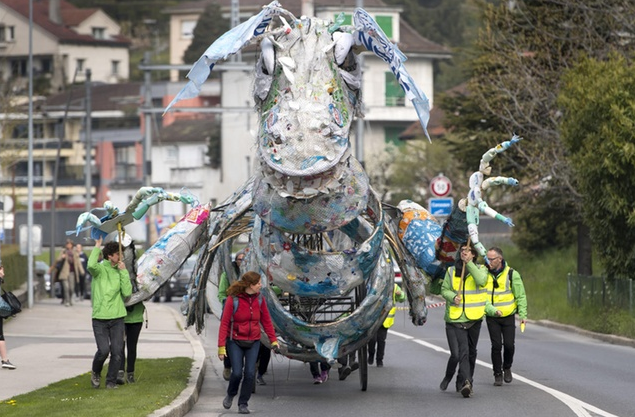Environmental activists have previously called attention to the excessive use of single-use plastics by large corporations such as Nestlé, which in April 2019 received a giant monster made of plastic waste from Greenpeace at its Vevey headquarters. The Swiss food giant has been placed second behind Coca-Cola in an audit of plastic waste by a coalition of environmental organisations. The results of the analysis, released on Wednesday by the Break Free From Plasticexternal link movement, prompted the authors to single out the corporations that finished in the top three for the second year in a row – Coca-Cola, Nestlé and PepsiCo – for having offered “mostly false solutions to the plastics crisis.” “This report provides more evidence that corporations urgently need
Topics:
Swissinfo considers the following as important: 3.) Swiss Info, 3) Swiss Markets and News, Business, coca cola, Featured, Nestlé, newsletter, PepsiCo
This could be interesting, too:
investrends.ch writes Nestlé will 16 000 Stellen streichen
investrends.ch writes Nestlé-Aktien stehen nach neuerlichem Führungswechsel unter Druck
investrends.ch writes Nestlé-Aktien verlieren nach mauen Halbjahreszahlen
investrends.ch writes Preisaufschläge «versüssen» Nestlé den Start ins Jahr 2025

Environmental activists have previously called attention to the excessive use of single-use plastics by large corporations such as Nestlé, which in April 2019 received a giant monster made of plastic waste from Greenpeace at its Vevey headquarters.
The Swiss food giant has been placed second behind Coca-Cola in an audit of plastic waste by a coalition of environmental organisations.
The results of the analysis, released on Wednesday by the Break Free From Plasticexternal link movement, prompted the authors to single out the corporations that finished in the top three for the second year in a row – Coca-Cola, Nestlé and PepsiCo – for having offered “mostly false solutions to the plastics crisis.”
“This report provides more evidence that corporations urgently need to do more to address the plastic pollution crisis they’ve created,” said Von Hernandez, global coordinator of the movement, which has nearly 1,800 member organisations worldwide. “Their continued reliance on single-use plastic packaging translates to pumping more throwaway plastic into the environment.”
The audit operation, conducted on World Cleanup Day in more than 50 countries last September, uncovered over 476,000 single-use plastic packages and other recuperated plastic waste, 43% of which could be clearly attributed to a specific brand.
Along the shores of Lake Geneva in the town of Vevey, volunteers collected over 1,100 items of plastic in just two hours, said environmental NGO Greenpeace, a member of the Break Free movement. Here too Nestlé was the second biggest polluter, behind retailer Coop and ahead of Coca-Cola. Other major corporate culprits identified during the local cleanup included some of the biggest retailers in the country, namely Migros, Denner and Lidl Switzerland.
Globally, multinationals such as Mondelēz International, Unilever, Procter & Gamble, and Swiss-based Phillip Morris rounded out the list of top ten polluters.
No more free plastic bags
Two of the biggest Swiss retailers, Coop and Migros, announced on Wednesday they would no longer offer plastic bags free of charge to customers across their shops starting next year. Both companies plan to continue selling carrier bags in their supermarkets for a small fee, as part of an industry agreement in place since 2016 that aims to reduce the use of single-use plastics.
The fee-based system will be extended to their non-food shops, where plastic bags are currently given to customers for free. Proceeds from this scheme will go to its fund for sustainable development, Coop said.
Coop and Migros said that, since 2016, they had succeeded in reducing the consumption of plastic carrier bags in their supermarkets by more than 85% and by 83%, respectively.
Plans are underway to expand the plastic-reduction agreement between the Swiss Retail Federation and the country’s four main retail groups (CI Commerce de détail suisseexternal link) to cover reusable plastic bags and the non-food sector by the end of 2019.
Tags: Business,coca cola,Featured,Nestlé,newsletter,PepsiCo
